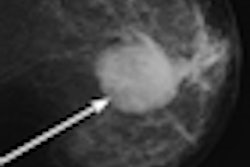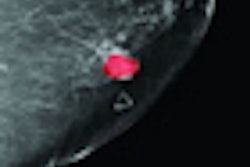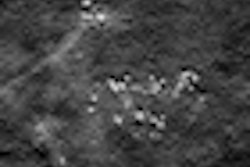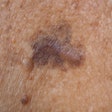In the 18 months since Connecticut passed a law mandating that women undergoing mammography be informed of their breast tissue density rating, more states have begun considering similar legislation.
In addition to requiring that women be educated about their breast tissue density, many of the bills state that health insurers must pay for additional screening if a mammogram shows dense tissue. And density awareness advocates hope radiologists can help their cause by telling referring physicians about the importance of breast density in assessing a woman's risk of breast cancer.
In October 2009, Connecticut passed a law requiring that written mammography results given to patients include information about breast density based on the American College of Radiology's (ACR) BI-RADS lexicon. In that same year, the state of Illinois passed Public Act 95-1045, declaring that if a routine mammogram reveals dense breast tissue, payors must cover a comprehensive ultrasound screening of an entire breast or breasts, when determined to be medically necessary by a physician.
The Connecticut bill was prompted in part by the experience of Nancy Cappello, PhD, a Connecticut woman who received a diagnosis of advanced-stage breast cancer in 2004, at age 51. Because Cappello had dense breast tissue, her cancer was not discovered by annual mammograms, even though she had already received more than 10. To address the issue of breast density, Cappello founded Are You Dense, an organization that urges women to be informed about dense breast tissue and how it affects early detection of breast cancer.
Out of Are You Dense has come the Density Education National Survivors' Effort (DENSE), a grassroots organization that supports further breast density notification legislation, Cappello told AuntMinnie.com.
"I started getting emails on my website from women with similar stories, who were diagnosed with cancer at a later stage than necessary and never knew anything about breast density," she said. "DENSE came out of those contacts."
The density bandwagon
Many more states are now drafting or presenting similar legislation. In January, Texas state Sen. Rodney Ellis (D-Houston) introduced SB 1381, and state Rep. Ana Hernandez (D-Houston) is sponsoring corresponding bill HB 834. In February, California state Sen. Joe Simitian (D-Palo Alto) introduced bill SB 173, which calls for healthcare service plan contracts and health insurance policies to include additional benefits for comprehensive ultrasound screening under certain circumstances. It would also require women receiving treatment under those coverage provisions to be informed of their breast density.
And in New York, state Sen. John Flanagan (D-2nd District) introduced bill S1883A, which calls for health insurance policies to provide additional coverage for supplementary screening tests if a mammogram shows dense breast tissue.
Other efforts include the following:
- Florida state Rep. Elaine Schwartz (D-Hollywood) is sponsoring HB 25, while state Sen. Jeremy Ring (D-Margate) is sponsoring SB 96; both seek to attach breast density advisories to mammogram results.
- Massachusetts state Rep. Kathi-Anne Reinstein (D-Revere) plans to introduce a breast density bill this year.
- States such as Kansas, Missouri, New Hampshire, and Ohio are actively seeking sponsors for similar legislative action.
On the national level, Rep. Steve Israel (D-NY) and Rep. Rosa DeLauro (D-CT) are working on a federal bill that would ensure that women receive information on breast density in their mammography reports.
Even breast cancer research giant Susan G. Komen for the Cure has come out in support of women being informed of their breast density, Cappello said.
"The movement is spreading," she said. "We're organized, and we're being strategic in how we're working with radiologists and legislators."
What can radiologists do to spread the word to patients about breast density? Buddy up with referring physicians, according to Cappello.
"Radiologists need to work with referring physicians," she said. "Many referring physicians don't understand the issue of breast density. They look at the BI-RADS rating, and if the woman's OK, they're done. But she may not be OK."



















